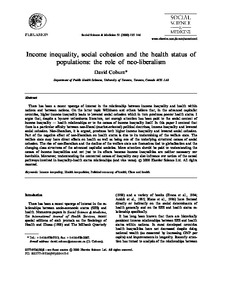Income inequality, social cohesion and the health status of populations: the role of neo-liberalism

2000
51
135-146
capitalism ; economic and social cohesion ; income ; social class ; social conditions ; health status ; social inequality
Occupational safety and health
English
Bibliogr.
"There has been a recent upsurge of interest in the relationship between income inequality and health within nations and between nations. On the latter topic Wilkinson and others believe that, in the advanced capitalist countries, higher income inequality leads to lowered social cohesion which in turn produces poorer health status. I argue that, despite a by-now voluminous literature, not enough attention has been paid to the social context of income inequality--health relationships or to the causes of income inequality itself. In this paper I contend that there is a particular affinity between neo-liberal (market-oriented) political doctrines, income inequality and lowered social cohesion. Neo-liberalism, it is argued, produces both higher income inequality and lowered social cohesion. Part of the negative effect of neo-liberalism on health status is due to its undermining of the welfare state. The welfare state may have direct effects on health as well as being one of the underlying structural causes of social cohesion. The rise of neo-liberalism and the decline of the welfare state are themselves tied to globalization and the changing class structures of the advanced capitalist societies. More attention should be paid to understanding the causes of income inequalities and not just to its effects because income inequalities are neither necessary nor inevitable. Moreover, understanding the contextual causes of inequality may also influence our notion of the causal pathways involved in inequality-health status relationships (and vice versa)."
Digital
The ETUI is co-funded by the European Union. Views and opinions expressed are however those of the author(s) only and do not necessarily reflect those of the European Union or the ETUI.